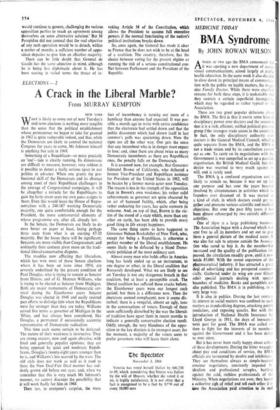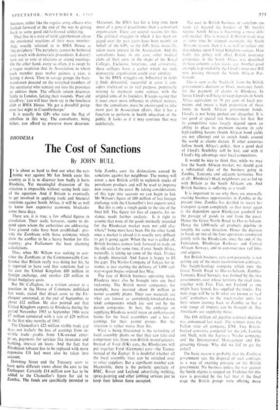BMA Syndrome
MEDICINE TODAY
By JOHN ROWAN WILSON
AWEEK or two ago the BMA announced that it was opening a new department of audio- visual communications, aimed largely at public health education. In the same week it also decided to close down its principal means of communica- tion with the public on health matters, the maga- zine Family Doctor. While there were excellent reasons for both these steps, it is undeniable that they contain a certain superficial incongruity, which may be regarded as rather typical of he Association.
There are two great popular delusions about the BMA. The first is that it exerts some kind of disciplinary power over doctors and the second is that it is a rich, efficient, unified political pressure group ('the strongest trade union in the country). In fact, the only disciplinary authority over doctors is the General Medical Council, which is quite separate from the BMA, and the BMA is net a trade union and by its constitution cannot act as one. To carry on its negotiations with the Goverment it was compelled to set up a parallel organisation, the British Medical Guild, but this device was resorted to very much against its will, and is rarely used.
The BMA is a confused organisation and is likely to remain so, because it was set up for one purpose and has over the years become involved by circumstances in activities which its founders ever dreamed of. It was started as a kind of club, in which doctors could get to- gether and promote various scientific and medical objectives. But over the past fifty years it has been almost submerged by two entirely different activities.
One of these is a large publishing business. The Association began with a Journal which was sent free to all its members and set out to give them a general picture of the medical scene. It was also for sale to anyone outside the Associa- tion who cared to buy it. As the membership increased and the quality of the publication im- ptoved, the circulation steadily grew, until it now totals 85,000. With the recent expansion of the pharmaceutical industry, it has attracted a great deal of advertising and has prospered commer- cially. Gathered under its wing are over fifteen other special journals dealing with special branches of medicine. Books and pamphlets are also published. The BMA is in publishing, in a vary large way.
It is also in politics. During the last century its interest in social matters was confined to such matters as standardising degrees, attacking patent medicines, and exposing quacks. But with the introduction of National Health Insurance by Lloyd George in 1911, the days of innocence were past for good. The BMA was called on then to fight for the interests of its members against the Government and it has been doinit, so ever since.
But it has never been really happy about either of these developments. During the bitter wrangles about pay and conditions of service, the BMA officials are tormented by doubts and inhibition-. They see themselves always as simple-hearted amateur negotiators, constantly impeded by idealism and professional scruples, battling against the cold, ruthless professionals of the Ministry. When negotiations are over, they heave a collective sigh of relief and tell each other it is time the Association paid attention to its real
business, rather like the regular army officers who looked forward at the end of the war to getting back to some good old-fashioned soldiering.
They live in a state of mild apprehension about the emotional reactions of their mass member- ship, usually referred to in BMA House as 'the periphery.' The periphery cannot be bothered very much with democratic procedures. It doesn't turn out to vote at elections or attend meetings. On the other hand, every so often, it is swept by a vague suspicion that its Association, to whom each member pays twelve guineas a year, is letting it down. Then in savage groups the back- woodsmen descend on the wretched members of the secretariat who venture out into the provinces to address them. The officials return disconso- lately to London, licking their wounds. 'Poor old Geoffrey,' you will hear them say in the luncheon club at BMA House. 'He got a dreadful going- over last night in Crumblethorpe.'
It is usually the GPs who raise the flag of rebellion in this way. The consultants, being richer, can afford to preserve more decorum. Moreover, the BN1A has for a lone time been more of a general practitioner than a consultant organisation. There are several reasons for this. The political struggles in which it has been en- gaged over the past years have been mainly on behalf of the GPs. so the GPs have, naturally, taken more interest in the Association. And th,! consultants have, in anv case, other medical clubs of their own, in the shape of the Royal Colleges. Exclusive, luxurious, and aristocratic. these colleges have a cachet which no truly democratic organisation could ever emulate.
So the BMA struggles on. Influential in fields it finds distasteful, successful in areas it con- siders irrelevant to its real purpose, perpetually striving to maintain some contact with the original aims of its founders. It keeps saying that it must exert more influence in clinical matters, that the consultants must be encouraged to take more part in Association affairs, that it has a function to perform in health education of the public. It looks as if it may continue that way indefinitely.



































 Previous page
Previous page